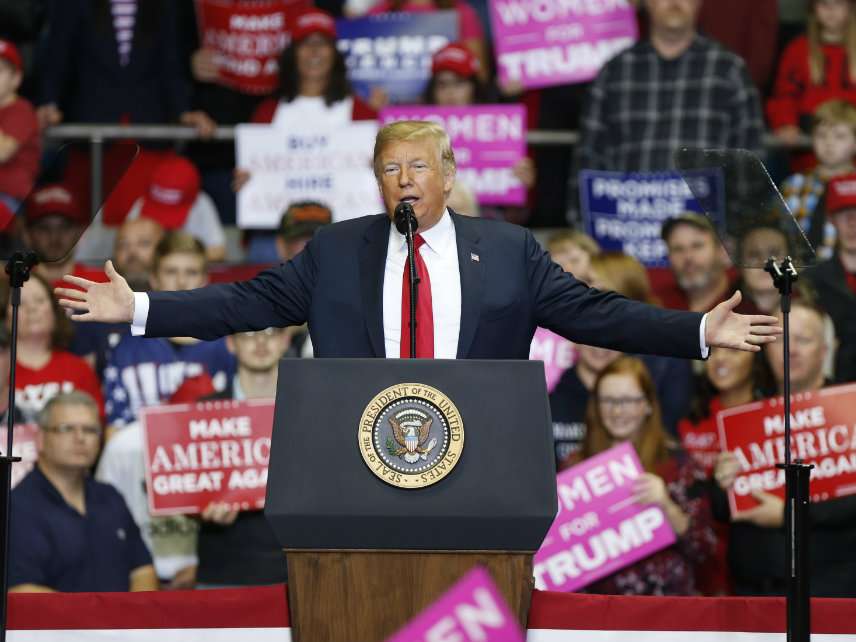Trump Warns That Democrats 'Would Obliterate Obamacare'
At an election-eve campaign rally, Trump all but defends the health law he tried to repeal.

At a campaign rally last night, President Trump came very close to defending Obamacare, warning that if Democrats came to power, they will "obliterate" the health care law.
"If Democrats gain power on Tuesday, one of their very first projects will be a socialist takeover of American healthcare," he said, according to The Washington Examiner. "You know what's happening. And your taxes are going to triple, maybe quadruple. You're not going to be happy. I know you well. The Democrat plan would obliterate Obamacare. It will also — which is good but leave the bad parts behind. It will destroy Medicare." (Emphasis mine.)
This might sound strange coming from Trump, who campaigned against Obama's health care law, and who backed measures last year that would have repealed much of the law. And to be fair, Trump suggests that obliterating the law is "good"—while also saying that the real problem is that Democrats would leave the "bad parts" of the law in place, implying there are good parts he wants to keep.
It's possible that it was simply a verbal misstep, and that what Trump really meant was to say Democrats would destroy Medicare, and then tried to cover the mistake before going back to what he intended to say.
But it's just as plausible that Trump now views defending Obamacare, which has gained popularity under his presidency, as a winning political issue.
Despite his support for last year's Obamacare repeal bills, Trump has more recently taken to arguing that Republicans support maintaining protections for pre-existing conditions—even though his administration is refusing to defend those rules in court. Other Republican candidates have been even more aggressive in clarifying that they mean support for insurance company regulations, with Arizona Senate candidate Martha McSally running ads saying she has led the fight to "force insurance companies to cover pre-existing conditions."
In addition, Trump—as he did last night—has repeatedly defended Medicare, the federal health program for seniors, arguing that Democrats would ruin it with "socialism," a strange (yet somehow unsurprising) argument given that Medicare, in its current form, is already America's biggest socialist health care program. That argument has been echoed by other Republican candidates, suggesting that Republicans are continuing to grow more comfortable defending large government-run health care programs.
Not all Republican rhetoric this campaign season has been objectively pro-Obamacare. Senate Majority Leader Mitch McConnell, for example, recently said that Republicans might take another run at a health care bill, depending on the election results. But even McConnell's rhetoric has undergone a subtle shift. Where he used to talk more openly about repealing Obamacare, he now says things like, "We're not satisfied with the way Obamacare is working." This could be sloppy phrasing on his part, but it also sounds as if, given the opportunity, he might work to tweak the Obamacare rather than wipe it off the books.
If all this sounds somewhat muddled and confused, that's probably because, when it comes to health care, Republicans don't really know what they think. That was apparent during last year's repeal push, when GOP lawmakers struggled to craft a replacement plan despite years of promising a replacement, and now, in the shadow of the repeal effort's failure, it is even more clear.
There are both political and policy reasons for this confusion. Under President Obama, repeal was a winning slogan, because Obamacare was unpopular. But under Trump, the law has become a political winner, and Republicans have struggled to figure out how to respond. In part they have chosen to obfuscate, particularly when it comes to pre-existing conditions. But those statements, which offer rhetorical acceptance of the underlying premise of Obamacare's regulatory scheme, also suggest that Republicans may be stumbling towards defending the law, or something roughly like it, partly as a response to shifting polls, and partly as a response to growing Democratic support for single payer.
At the moment, Republicans lack policy support for their rhetoric, but that's not particularly surprising at a moment when Republicans lack much of a domestic policy agenda of any kind. And it's not as if the GOP would need to look too far: After all, Obamacare was built on ideas that were initially championed by Republicans. Although the party never fully rallied around the plan, it wouldn't be surprising to see Republicans shift towards support for a system that relies on private providers as Democrats push for greater direct government intervention.
So Trump's remark about Obamacare may or may not have been a slip of the tongue, but either way, I suspect that they offer yet another preview of how I expect the nation's health care debate will shape up, with Republicans awkwardly defending something like Obamacare, and Democrats making an increasingly aggressive case for something like single payer.


Show Comments (85)